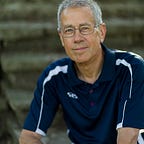Where There Is Hatred…
It is so very difficult. When I witness anger and hatred boiling out of a mass of humanity, as that which flooded my life on January 6, part of me wants to turn away and remain in denial. Another part sets out, with the rest of me as an unwitting accomplice, to hate those who hate. In those moments I am reminded of words from The Prayer of St Francis: “Where there is hatred, let me sow love.” Neither turning away, nor allowing hatred to take me hostage, helps heal the wounds that underpin the anger that erupts in the world.
Let me be clear, I am terrified by what the far-right intends for the future of the United States, and globally. There are millions who want a racist world order I find reprehensible. But in this moment, I am desperately trying to separate the movement from individuals that inhabit it.
Anger and hatred are often consequent emotions. If I have learned anything from 18 years answering calls on a suicide hotline, it is this: what shows up as anger and hate, usually emerge out of profound sorrow, deep hurt, or debilitating fear. Sometimes all three. Christian Picciolini, a former neo-Nazi punk rock musician, and founder of the Free Radicals Project, now works tirelessly to prevent extremism and help people disengage from hate movements. In his raw, emotionally-charged book, Breaking Hate: Confronting the New Culture of Extremism, Picciolini reveals his secret to helping people escape…he listens. He listens without judgement for what he calls the “potholes” in their lives — abuse, bullying, desertion, loss, grief, and more — that leave them feeling lost, alone, marginalized, and worthless. Arguments, logic, and rationality are, in his experience, not helpful. Those devices, to which we so quickly turn, leave the person in his midst feeling unheard, lost, and lonely. They can even trigger a frightened, vulnerable individual and send them back to the safety of the extremist community that first took them in. Understanding and empathy are the only keys that unlock doorways.
In a post on social media, I recommended four books, including Breaking Hate, that have helped. They do not, even for an instant, enable me to accept the hateful language, but they have offered a glimpse into the emanation of far-right vitriol. When I suggested these volumes, one respondent replied, “Understanding it is pointless. The only thing to do is to stop tolerating it and begin prosecuting, stopping, and jailing every last traitor.” If we are talking appropriate consequences for a mob trashing the rule of law, I agree. However, if, instead, I focus on the millions of individual broken souls that inhabit that dark and dangerous landscape, I must demur. In an interview, Jitarth Jadeja, who spent two years as a dedicated follower of QAnon, but now understands the horrific lies and fabrications, was asked how to help others discover the truth. “It has to start with empathy and understanding,” he said.
Shortly after January 6, a friend asked, “What about ISIS? They want to kill me. Am I supposed to offer them empathy and understanding?” Call me naïve, but, even there, in a one-on-one, human conversation with a person who sees differently than I, what might I discover about the treacherous mountains and terrifying chasms millions must endure? Those lessons are only available if I first try to understand rather than insisting on being understood.
The Prayer of St. Francis continues: “Where there is doubt, let me sow faith; where there is despair, hope; where there is darkness, light; and where there is sadness, joy.” If I begin in this moment, is there even a remote chance of healing a miniscule portion of the profound sorrow, deep hurt, and debilitating fear that is in my midst every day, but to which I am often blind?
It is so very difficult, but, in the end, it is the most enlightening and joyful of journeys.
